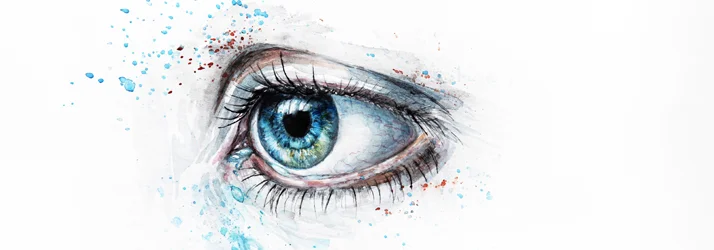Advanced Relief for Dry Eye Syndrome with Enhanced Eyecare NJ

Staring at a screen for hours, whether for schoolwork or social media, has become a regular part of daily life. But what happens when that screen time leads to eyes that feel gritty, tired, and uncomfortable? Dry, irritated eyes can make even simple tasks, such as reading, driving, or relaxing, feel like a challenge. If you are experiencing these symptoms, you may have Dry Eye Syndrome. At Enhanced Eyecare NJ, we specialize in diagnosing and treating this common condition. We help you achieve effective, long-term relief, allowing you to return to your life with a clear and comfortable vision.
The Causes and Types of Dry Eye Syndrome
Dry Eye Syndrome is a common and often chronic condition that occurs when your eyes do not produce the correct quantity or quality of tears to stay properly lubricated. Tears are much more than just water; they are a complex mixture of oil, water, and mucus that keeps the surface of your eyes clean, smooth, and healthy. When this delicate balance is disrupted, your eyes can feel dry, itchy, and sore.
A primary cause of dry eye, affecting the vast majority of cases, is Meibomian Gland Dysfunction (MGD). These tiny, oil-producing glands are located in your eyelids and are responsible for secreting the oils that prevent your tears from evaporating too quickly. When these glands become blocked or fail to function correctly, the tear film loses its protective oily layer, resulting in rapid tear evaporation and ocular surface irritation.
While MGD is a leading factor, other causes and risk factors can contribute to dry eye, including:
- Prolonged Digital Screen Use: Staring at phones, computers, or tablets for extended periods often leads to a reduced blink rate, which prevents tears from being spread evenly across the eye.
- Environmental Conditions: Exposure to dry or windy weather, as well as time spent in air-conditioned or heated rooms, can increase tear evaporation.
- Medication Side Effects: Certain medications, such as antihistamines, decongestants, and antidepressants, can reduce tear production.
- The Aging Process: As we get older, tear production naturally slows down, making dry eye more common in adults over 50.
- Hormonal Changes: Fluctuations in hormones, particularly in women during pregnancy or menopause, can lead to dry eye symptoms.
Understanding the underlying cause—whether it is due to poor tear quality (evaporative dry eye) or low tear production (aqueous-deficient dry eye)—is key to effective treatment. At Enhanced Eyecare NJ, we pinpoint the exact reason for your discomfort to create a targeted and effective management plan.
Recognizing the Symptoms and Everyday Impact of Dry Eyes
Dry Eye Syndrome can make your eyes feel irritated and tired. You may notice a burning, stinging, or gritty feeling as if something is in your eyes. Some people even have watery eyes that still feel dry. These symptoms can develop gradually and worsen over time.
Be watchful for common symptoms such as:
- A persistent stinging, burning, or gritty feeling, as if something is in your eyes.
- Redness and soreness of the eyes.
- Periods of watery eyes, as the body overcompensates for the dryness, followed by arid periods.
- Blurred vision, especially when reading or after long periods of focus.
- Increased sensitivity to light.
- Difficulty wearing contact lenses comfortably.
These symptoms can have a significant impact on your focus and productivity, making it harder to read, drive safely, or work efficiently on digital screens. For students and professionals alike, managing these effects is crucial for daily performance and comfort.
The Role of Meibomian Glands in Eye Comfort and Lubrication
Your eyelids are home to dozens of tiny oil glands called meibomian glands, which play an indispensable role in maintaining comfortable and lubricated eyes. With every blink, these glands release a special oil called meibum. This oil spreads across the surface of your eye, mixing with the watery part of your tears to create a stable, protective film. This oily layer is what prevents your tears from drying out too quickly between blinks.
When these glands become blocked with thickened or hardened oil, it results in Meibomian Gland Dysfunction (MGD), the leading cause of Dry Eye Syndrome. Without a sufficient amount of oil, your tears can evaporate up to 16 times faster than they normally would. This rapid evaporation leaves the sensitive surface of your eye exposed, leading to inflammation, irritation, and the uncomfortable symptoms of dry eye. Maintaining the health of these glands is fundamental to comfortable, healthy vision.
Modern Technology and Advanced Testing for Dry Eye Diagnosis
At Enhanced Eyecare NJ, we utilize modern technology to move beyond symptom-based guesswork and uncover the true cause of your dry eye. Our advanced diagnostic tools provide a detailed, microscopic view of your tear film and overall eye health.
We utilize state-of-the-art equipment to conduct a comprehensive evaluation, which enables us to measure your tear quality, detect signs of inflammation, and closely examine the structure and function of your meibomian glands. This precise, data-driven approach enables us to identify blockages or other issues early, allowing for a more effective and personalized treatment plan.
Effective Treatments for Lasting Relief from Dry Eye Syndrome
For many, over-the-counter artificial tears provide only temporary relief. For more significant and lasting comfort, especially for those with MGD, advanced therapies are necessary. At Enhanced Eyecare NJ, we offer cutting-edge, non-invasive treatments that target the underlying cause of evaporative dry eye.
- Intense Pulsed Light (IPL) Therapy: This treatment uses gentle, controlled flashes of light to warm the eyelids and reduce inflammation around the meibomian glands. This process helps to melt the hardened oil clogging the glands, improving their function and restoring a healthy tear balance.
- Radiofrequency (RF) Therapy: This therapy utilizes gentle radiofrequency energy to deliver uniform heat to the eyelids. This controlled warming safely liquefies blockages within the glands, allowing for the practical expression of stagnant oil and promoting better oil flow in the future.
These treatments work to restore the natural function of your oil glands, leading to a healthier tear film, reduced redness, and significant relief from irritation. By addressing the root problem, we can help you find stable, long-term comfort.
Self-Care Tips and Lifestyle Changes to Prevent Dry Eye Flare-Ups
You can take simple steps at home to help prevent dry eye symptoms and protect your vision. Small daily habits make a big difference in keeping your eyes healthy.
Try these easy tips:
- Blink often when using screens or reading.
- Drink plenty of water each day.
- Use a humidifier to keep the air moist indoors.
- Wear sunglasses outdoors to shield your eyes from wind and sun.
- Take breaks every 20 minutes when looking at screens.
- Avoid smoke or air blowing directly into your face.
If you wear contact lenses, clean them properly and replace them as advised. These habits, along with regular eye checkups at Enhanced Eyecare NJ, help keep your eyes comfortable and prevent future dryness. With good care and healthy routines, your eyes can stay clear and refreshed every day.
Meet Dr. Balvinder Bharj
Dr. Balvinder Bharj - Board Certified Optometrist
Dr. Balvinder Bharj is an board certified optometrist with over a decade of experience helping patients achieve clear and comfortable vision. She specializes in managing and treating a wide range of ocular conditions, including dry eye disease, eye allergies, styes, and red eyes, as well as monitoring for cataracts and glaucoma.
Having practiced in diverse settings across New York, Los Angeles, and New Jersey, Dr. Bharj brings a wealth of experience to her patient care. She earned her bachelor's degree from Penn State University and her Doctorate of Optometry from the IAUPR School of Optometry. Known for her thorough and caring approach, Dr. Bharj works closely with each patient to find the most effective treatment solutions for their unique eye health needs.
Payment and Insurance
We make paying for your eye care easy. Enhanced Eyecare NJ accepts a variety of insurance plans to help cover the cost of your visits. We accept:
- Aetna
- Cigna
- Horizon
If you have questions about your coverage, our team is happy to help you check your plan.
OFFICE HOURS
Monday
10:00am - 6:00pm
Tuesday
10:00am - 6:00pm
Wednesday
10:00am - 6:00pm
Thursday
10:00am - 6:00pm
Friday
10:00am - 6:00pm
Saturday
10:00am - 4:00pm
Sunday
Closed
Enhanced Eyecare NJ
Lenscrafters inside MACY's
20 Mall Dr E floor 2
Jersey City, NJ 07310



